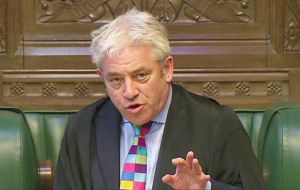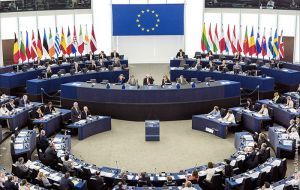MercoPress. South Atlantic News Agency
Johnson wants Parliament to vote “yes” or “no” on his Brexit deal on Monday
 The PM now wants MPs to say a clear “yes” or “no” to the deal on Monday, adding: “We cannot allow Parliament's letter to lead to Parliament's delay.” It will be up to Speaker John Bercow to decide whe
The PM now wants MPs to say a clear “yes” or “no” to the deal on Monday, adding: “We cannot allow Parliament's letter to lead to Parliament's delay.” It will be up to Speaker John Bercow to decide whe  It will be up to Speaker John Bercow to decide whether to allow the vote. Johnson reached a new deal with the UK last week but needs parliament approval for it
It will be up to Speaker John Bercow to decide whether to allow the vote. Johnson reached a new deal with the UK last week but needs parliament approval for it  The EU is now considering how to respond to the UK's request for a delay, but has said Saturday's developments did not mean that the deal had been rejected.
The EU is now considering how to respond to the UK's request for a delay, but has said Saturday's developments did not mean that the deal had been rejected. Parliament must be given “a straight up-and-down vote” on the PM's Brexit deal, No 10 says, after MPs delivered a major blow to his strategy on Saturday. Boris Johnson was forced by law to send a letter asking the EU for a new delay on Brexit but did not sign it.
The PM now wants MPs to say a clear “yes” or “no” to the deal on Monday, adding: “We cannot allow Parliament's letter to lead to Parliament's delay.”
It will be up to Speaker John Bercow to decide whether to allow the vote. Johnson reached a new deal with the UK last week but needs approval for it from the UK Parliament.
The EU is now considering how to respond to the UK's request for a delay, but has said Saturday's developments did not mean that the deal had been rejected.
Having reached a new Brexit deal with the EU last week, the prime minister had intended to bring it to Parliament on Saturday and to ask MPs to approve it in a so-called “meaningful vote”.
The numbers looked tight for the PM, especially without the support of his erstwhile allies the DUP, but Tory Brexiteers had thrown their weight behind it as had a number of Labour MPs and independents.
However, instead of voting on the deal itself, MPs instead voted in favor of an amendment - tabled by Tory MP Sir Oliver Letwin - withholding approval of the deal until the legislation to implement it had been passed.
That triggered the Benn Act which required Mr Johnson to send a letter to Brussels requesting a delay to the UK's departure. He did that, but left it unsigned - and accompanied it with a second, signed letter which said he believed a delay would be a mistake.
On Sunday, ministers insisted the government believed it still had sufficient support in the Commons to pass the deal and remained committed to a 31 October departure.
On Monday, the government will make a second attempt to hold the meaningful vote - without the Letwin amendment - presenting MPs with a straight choice to approve or oppose the deal in principle.
Whether Speaker Bercow will allow that, though, is not yet clear - he could rule it out on the grounds it amounts to debating the same matter twice.
No 10 said: “Letwin's delay amendment turned Saturday into a meaningless vote and denied MPs and the public the chance to end the uncertainty.”
It added: “Parliament needs a straight up-and-down vote on the deal - do MPs want to respect the referendum like they claim to... or do they want to frustrate and cancel Brexit altogether?”
The government also plans to introduce the legislation required to implement the Brexit deal - the Withdrawal Agreement Bill - during Monday's Commons session.
Meanwhile Scotland's highest court will consider whether Mr. Johnson has fully complied with the law in his correspondence with Brussels. The Court of Session will be asked to decide whether, in sending contradictory letters, the prime minister broke a promise not to “frustrate” the so-called Benn Act.
One of the campaigners bringing the action, SNP MP Joanna Cherry said: “It will be for the court to decide whether his actions... are in breach of the undertakings he gave them, or a contempt of court.” The government maintains it has fulfilled its legal obligations.
The opposition Labour, SNP, Lib Dems and others roundly criticized Mr Johnson's decision to send two letters to the EU, calling it “childlike” and “petulant”. They also suggested he may have broken the law, or at least tried to frustrate it.
On the deal itself, shadow Brexit secretary Sir Keir Starmer told the BBC's Andrew Marr that Labour would seek to make changes to it, in particular backing an amendment requiring it to be put to another referendum - up against Remain.
He said he believed that would most likely be tabled by a backbencher, but insisted: “It's got to go back to the public.”
Labour had planned to vote against Boris Johnson's deal, arguing it would be bad for the economy, jobs, workers' rights and other areas such as the environment.
Sir Keir said the party would push for other changes when the bill was brought to Parliament, for example by demanding a UK-wide customs union with the EU and single market alignment, and ensuring there could not be a no-deal “trapdoor” at the end of the transition period if no free-trade agreement was reached with the EU.




Top Comments
Disclaimer & comment rulesCommenting for this story is now closed.
If you have a Facebook account, become a fan and comment on our Facebook Page!